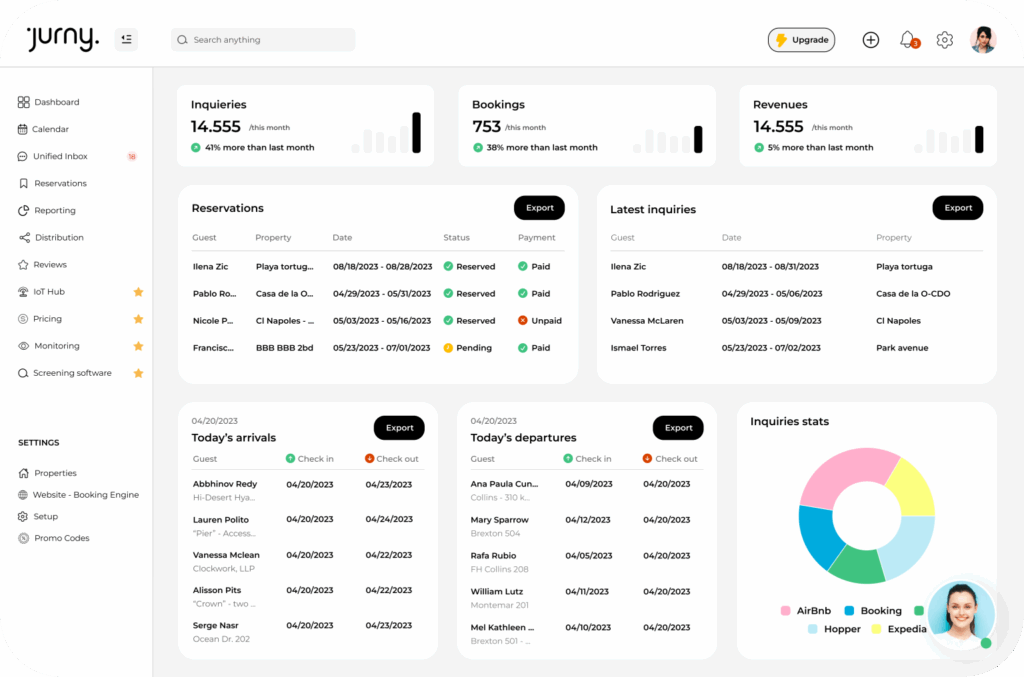Water has always been a central concern for Esther Altura. Growing up in Israel, she learned early on that conservation is not optional. That lesson stayed with her and now shapes the missio...
AI Agents and the Future of Hospitality: Jurny Automates and Elevates Guest Experiences




“The biggest opportunity in AI is in the infrastructure,” says Luca Zambello, Co-Founder and CEO of Jurny, a hospitality technology platform that’s rethinking property management across hotels and short-term rentals. “Unless you have $100 million sitting on the side, you’re not going to build your own LLM. The value lies in taking different models, training them for specific use cases, and leveraging an infrastructure to deploy these models for a useful purpose, like AI agents.”
This infrastructure-first approach has positioned Jurny at the forefront of hospitality technology, creating a system where multiple specialized AI agents work together to automate operations while simultaneously enhancing the guest experience.
From Italian Immigrant to Tech Innovator


Zambello’s journey into hospitality technology began when he moved from Italy to Los Angeles about 16 years ago. Noticing a significant gap in the online short-term rental market during the early days of Airbnb, he created a simple landing page called “House Rental Angels” to test demand.
“I put a small amount of ads on it, and that landing page did over $1.2 million in commissions that year,” Zambello recalls. But success brought competition quickly. “Within 12 months, I had dozens of competitors coming into the space. My ad costs 10x’d and my ROI went down dramatically.”
Emboldened by the lessons learned in this initial real estate venture, Zambello built a property management company focused on using technology to streamline operations. As the company grew to about 350 properties, they invested heavily in internal technology to address gaps in the market, particularly around automation, check-ins, and smart home integration.
“We were a bit ahead of the curve [as a management company], but we realized the real value was in the technology we built” he notes. As they examined their technology and its possible applications, Zambello honed in on the hospitality industry as the right market focus, leading to the launch of Jurny as a tech-focused spin-off of their management company.
The Hospitality Industry’s Automation Problem


From the beginning, Zambello identified a persistent challenge in hospitality: the need for automation that streamlines operations while not diminishing – or better yet, while enhancing – the guest experience.
“How do you automate all these moving pieces while elevating the guest experience?” he asks. “Hospitality is full of errors. It’s a high-churn environment. There are many jobs people don’t want to do, especially when dealing with guest support.”
The industry’s inefficiency stems partly from outdated systems. “Even some of the big companies in the space have ancient technology platforms. The industry has shown interest in modern technology, but most companies still operate on 20-year-old tech stacks.”
To create next-level automation, Jurny needed to build a centralized system with a strong infrastructure of APIs—gateways that allow different solutions to communicate and share information. This foundation became critical for their AI strategy.
A Network of Specialized AI Agents
After careful planning and development, what emerged was an innovative approach involving the creation of multiple specialized AI agents that work together, each handling specific aspects of hospitality management:
- Guest Support Agent: Communicates with guests, assists with check-ins, shares property information, and handles stay extensions.
- Concierge Agent: Specializes in upselling and personalizing guest experiences based on centralized guest data.
- Data Scientist Agent: Analyzes trends, generates reports, and provides business insights through natural conversation.
- Copilot Agent: Serves as the central coordinator, accessing all other agents to provide comprehensive business oversight and take actions based on verbal commands.
This multi-agent network requires centralized data to function effectively. “AI is only as good as its data,” Zambello explains. “Having centralized data is extremely important.”
The system enables capabilities that would be difficult for humans to consistently deliver. For example, the AI concierge can analyze guest data to make personalized recommendations: “If you know from past visits that a guest always travels for business, you can better predict their needs. They won’t need a birthday party room for their kids, but they might need a conference room.”
AI Delivers Better Personalization Than Humans


Zambello challenges the common belief that only humans can provide a truly personalized service. “I disagree with that. In some ways, I think AI is actually better at personalized guest experience,” he states firmly. With access to comprehensive guest data and consistent execution, he argues, AI can deliver not only highly personalized experiences, but also implement them at scale, at any time of day.
The results also yield clear financial benefit: “We already have, both in the hotel space and in the short-term rental space, operators making even 30% additional revenue without lifting a finger. They created all these upsells, and the system does that all automatically.”
Rather than replacing human staff, Zambello sees AI as elevating their role: “It doesn’t necessarily substitute people. It substitutes the annoying work that people need to do—the boring recording and routine and data entry and grinding work.”
This allows staff to focus on meaningful guest interactions: “Imagine a guest comes in, they don’t need to necessarily need to talk to the staff, but they talk to the staff because they want to. Now, armed with the right data, that staff member can be extremely helpful. With one click, they have access to the guest’s entire profile, where they’re staying, what they’re doing. The guest doesn’t have to ask you for anything, rather the team is there just to be helpful.”
Guests Want Solutions, Not Human Interaction
From the guest perspective, Jurny believes the primary concern isn’t who’s solving their problem but how quickly it gets resolved. “In guest support, so many times, guests don’t really care who they’re talking to. They only care that their problem gets solved quickly,” Zambello notes.
AI can deliver this speed while maintaining consistency across properties—something difficult to achieve with human staff alone. “If you as a property manager have a vision, or as a brand, you have a vision of what you want every single one of your guests to experience, having other humans being able to persuade that experience is really hard because you have to train every single one of them.”
With AI, that vision can be executed consistently across all properties and interactions. “AI is a boost in productivity and a boost in vision. AI is going to make the biggest, boldest visionary win, because big and bold visionaries before needed a lot of resources to execute their vision. This technology changes that completely.”
Bridging Short-Term Rentals and Hotels
Initially focused on the short-term rental market, Jurny has expanded into the hotel space, taking different approaches for each segment.
“We started specifically for the short-term rental space, but the hotel space has backed us to come to build solutions for them, as well,” Zambello explains. For short-term rentals, Jurny offers a full-service solution including a property management system (PMS). For hotels, which typically already have established PMS solutions, Jurny partners with existing systems to enhance their capabilities.
“We don’t want to disrupt their operations. We don’t want to disrupt their PMS. We become an enhancer for the system they have, and an enhancer for guest experience,” he says.
Zambello also notes the convergence between the short-term rental and hotel industries: “I see a lot of modern operators in the short-term rental space coming into the hotel space and taking on boutique hotels and running them in a more efficient or effective way. It’s very interesting how the two industries are getting closer and closer.”
Voice: The Next Frontier
Looking ahead, voice integration is a major focus for Jurny. “Voice is going to be big,” Zambello predicts. “We’re very excited with what voice can do. I think we’re just on the verge of making voice almost indistinguishable from humans and very natural. We all love to speak to get things done more than text.”
The Future of Hospitality Management
As AI continues to evolve, Jurny’s infrastructure-first approach demonstrates how technology can improve hospitality operations while enhancing the guest experience. By creating a network of specialized AI agents built on a foundation of centralized data, they’re enabling property managers and hoteliers to deliver consistent, personalized service at scale.
For Zambello, this represents just the beginning of AI’s impact on the industry: “This can happen across infinite industries, basically.”
As the lines between different hospitality segments continue to blur, platforms like Jurny are proving that they can bridge these worlds while delivering operational efficiency and exceptional guest experiences will likely play an increasingly important role in shaping the future of the industry.
Similar Articles
Explore similar articles from Our Team of Experts.




“We want to be the Four Seasons and the Ritz Carlton instead of the motel,” says Ting Qiao, CEO and Founder of Wan Bridge Group, describing his vision for the company’s rol...


Imagine walking down a tree-lined street in a neighborhood you’re considering. You hold up your phone, and suddenly the world expands with information. Floating above a charming coloni...


With over 50% of outstanding mortgages below 3.5%, the traditional resale market has stalled. In this challenging environment, Jome CEO Dan Hnatkovskyy has identified and capitalized on a cr...


“Today, architects are doing more than their previous generation – smaller teams doing more work, handling more responsibilities, and interacting with more groups,” reflects Et...


